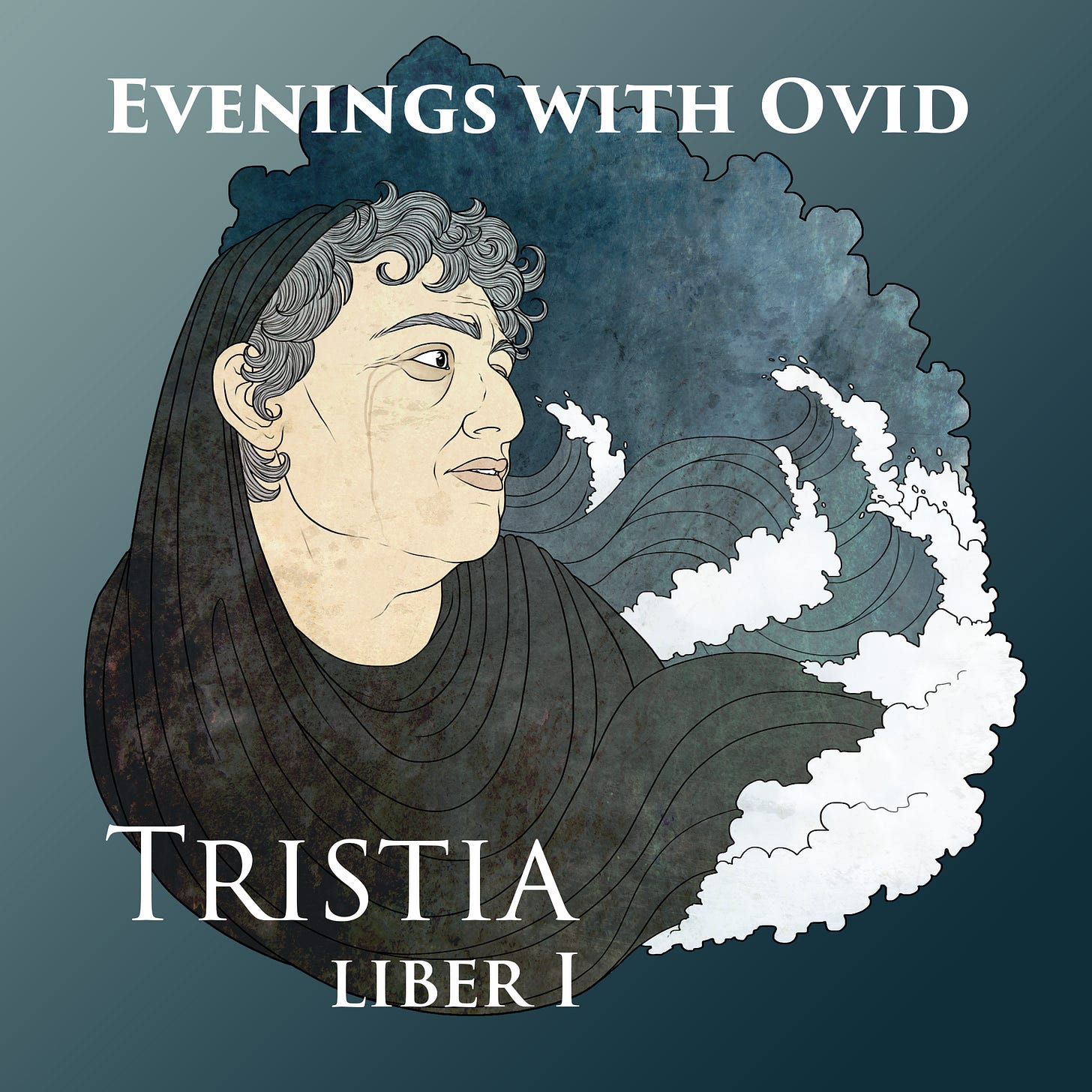The music for this podcast was generously provided by Dr. Stefan Hagel.
Cover illustration and voice of Ovid provided by Lu (twitter: @DRScomics, instagram: @dead_romans_society, tumblr: @ovidiana).
Foley sounds for soundscape provided by zapsplat.com.
Hosting, English sections, and editing provided by Margrethe.
Transcript:
Mar: Salve aveque. This is Margrethe from Ovid Daily, for our podcast special: “Evenings with Ovid”. Joining me today from the far-off shores of the Black Sea is the eminent Latin poet Publius Ovidius Naso, (given voice by the excellent Lu), here to read one of his most moving works: Tristia. Last week, we heard Carmina Quinta, where you treated us to an Odyssey in miniature, complete with wrathful gods and yourself as a sea-tossed sailor. Are you ready to share the next installment?
L/O: Ita. Aures praebete, quaeso, ne oblivia me obruant.
L/O:
Nec tantum Clario est Lyde dilecta poetae,
nec tantum Coo Bittis amata suo est,
pectoribus quantum tu nostris, uxor, inhaeres,
digna minus misero, non meliore uiro.
te mea supposita ueluti trabe fulta ruina est:
siquid adhuc ego sum, muneris omne tui est.
tu facis, ut spolium non sim, nec nuder ab illis,
naufragii tabulas qui petiere mei.
utque rapax stimulante fame cupidusque cruoris
incustoditum captat ouile lupus,
aut ut edax uultur corpus circumspicit ecquod
sub nulla positum cernere possit humo,
sic mea nescioquis, rebus male fidus acerbis
in bona uenturus, si paterere, fuit.
hunc tua per fortis uirtus summouit amicos,
nulla quibus reddi gratia digna potest.
ergo quam misero, tam uero teste probaris,
hic aliquod pondus si modo testis habet.
nec probitate tua prior est aut Hectoris uxor,
aut comes extincto Laodamia uiro.
tu si Maeonium uatem sortita fuisses,
Penelopes esset fama secunda tuae:
siue tibi hoc debes, nullo pia facta magistro,
cumque noua mores sunt tibi luce dati,
femina seu princeps omnes tibi culta per annos
te docet exemplum coniugis esse bonae,
adsimilemque sui longa adsuetudine fecit,
grandia si paruis adsimilare licet.
ei mihi, non magnas quod habent mea carmina uires,
nostraque sunt meritis ora minora tuis,
siquid et in nobis uiui fuit ante uigoris,
exstinctum longis occidit omne malis!
prima locum sanctas heroidas inter haberes,
prima bonis animi conspicerere tui.
quantumcumque tamen praeconia nostra ualebunt,
carminibus uiues tempus in omne meis.
Mar: Gratias tibi ago, Ovidi. I have here the English translation of our guest’s poem, originally translated by A.L. Wheeler in 1924.
“Not so great was the love of the Clarian bard for Lyde or that of her own Coan for Bittis as the love that clings in my heart for thee, my wife, for thee who art worthy of a less wretched, not a better, husband. Upon thee as upon a supporting pillar my ruins rest; if even now anything of me exists, it is all thy gift. Tis thy doing that I am not plundered nor stripped bare by those who have attacked the timbers of my wreckage. As the wolf ravening under the goad of hunger and eager for blood strives to catch the sheepfold unguarded, or as the hungry vulture peers about for the possible sight of some unburied corpse, so there was one, treacherous in my bitter fortune, who, hadst thou suffered it, would have come into my wealth. Him thy courage has repelled with the aid of spirited friends whom I can never thank as they deserve. Thus thou art approved by a witness as sincere as he is wretched, if only such a witness carries any weight. In uprightness neither Hector's wife excels thee, nor Laodamia, companion of her husband in death. If fate had allotted thee the Maeonian bard, Penelope's fame would be second to thine, whether thou owest this to thyself, schooled to loyalty by no teacher, and such character was given thee with life's earliest dawn, or whether that first of women, reverenced by thee through all the years, teaches thee to be the model of a good wife and by long training has made thee like herself if 'tis lawful to liken great things to small. Alas that great power lies not in my song and my lips cannot match thy merits!—if ever in former times I had aught of quickening vigour, all has been extinguished by my long sorrows!—else thou wouldst hold first place amid the revered heroines, first wouldst thou be looked upon because of thy qualities of heart. Yet so far as my praise has power, thou shalt live for all time in my song.”
Mar: Thank you so much for listening, and be sure to tune into Ovid Daily’s “Evenings with Ovid” next week for the next installment of Ovid’s Tristia. Vale beneque placideque quiescas!
Mar: A transcript for this podcast is available at oviddaily.substack.com. Our text comes from the 1924 Loeb Classical Library edition of the Tristia, edited and translated by A.L. Wheeler. Our music is performed by Dr. Stefan Hagel on the Hellenistic Aulos, a link to which is available in the description, and on our website on our “Resources” page. Foley sounds for our soundscape are provided by zapsplat.com. Our lovely cover art was illustrated by Lu, and you can see more of Lu’s art on Twitter @DRScomic, or on Tumblr @ovidiana. If you wish to contact Ovid Daily, you may email me at oviddaily@substack.com.











Share this post